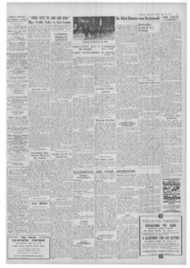Page 2, 13th July 1945
Page 2

Report an error
Noticed an error on this page?If you've noticed an error in this article please click here to report it.
Tags
Share
Related articles
Other Things Did Happen In 1968 • • •
Malta Dilemma
All Sorts : By Fr. Basset, S.j.
The Whole Luther
Race Not Birth Control Splits
LUTHER AND CARD. GASQUET
From Dr. COULTON Six-ISee that you have permitted Mr. ,Arnold Lunn to attack me upon a subject which is still sub fudice in that book, The Roman Question. which Messrs. Burns and Oates have now in hand.
My lecture, " In Defence ot the Reformation," to which he alludes, led to a question fl om it Protestant minister present: " Why had 1 nor mentioned Luther?" I answered that I looked upon Luther as a psychological puzzle; that there was much that repelled me, while on the other hand I had deep admiration for such writings as his " Address to the Getman People " I emphasised this puzzle so plainly that a Roman Catholic hearer, Mr. Alstou, wrote triumphantly to the papers, " Dr. Coulton said there was much in Luther's character which he abhorred." The period is one where I have never, found time or energy to grapple with the original sources; iodeed, as Mr. Lunn now points out, even the apologists of your own Church in English-speaking countries heve only just realised the crucial point as revealed by a German Protestant, When Denille's book came out I dipped into it enough to see that it had seriously shaken the Luther legend; but the one quite incite:test-dile passage was until Mr. Lunn forced it Mom toy attention a few months ago, as unknown to me as it had been to Mr. Lunn himself when he performed in America as supplementary professor of apologetics at Notre Dame. Once
confronted with this, immediately ngreed with Mr. Lunn that.it was unpardonably blasphemous; and this confession will he found in our joint book. In abandoning Luther thus far, I hoped I was acting up to my main principle, which Mr. Lunn ignores with his boasted " dogged pertinacity " every time I come across him. I have always maintained and here at least I trust in your approval) that the main and most serious difference is
not " klas the writer fallen into error?" but " When corrected, has he confessed, and sought absolotion from the public?" By that rule. of conduct, how must we judge Clasquet, who could boast publicly in a prepared speech that scholars in Germany " have regarded nly elevation as an honour to the historians of the world." See p. 261 of my Ten Medieval Studies. I did not attack him, as Mr. Long falsely represents. for sins of omission. but of commission. In his Old English Bible tie founded a theory of primary apologetic importance upon the false assertion that certain words did not occur in certain pages of a certain hook. He might as reasonably have denied that his own name began with a G. This was pointed out in the Church Quarterly. The Tithes and the Church Tithes on different occasions wanted him that he must answer: mere silence would not do. Yet sile.nce was his sheet-anchor anti he died impenitent.Nor was this, by far, his only fault of commission, In the appendix to my Ten Medieval Studies, I listed nearly two hundred had blunders, sometimes in Latin and sometimes ignorant misstatements such as that clandestine marriages, by medieval Canon Law, were not merely punishable hut itivefiri. Look at p. 203 of that hook. Read the first 10 cases as a sample, and you will see that every one is a false assertion. Therefore I appeal to Mr. Lunn here and now (as 1 have repeatedly but vainly appealed to him dsewherel for any non-Roman Catholic parallel to this: so exalted a dignitary and so unblushingly unrepentant from year to year. Even Mr. Lunn, in one or our Burns and Oates letters, writes: " I have never met a Catholic who was prepared to defend in private die lapses of Cardinal Casio:et which Dr. Coulton attacked." The Editor of the Tablet has lately given him up. In private, but why not iti pubire? You yourself cannot have forgotten how in your own columns, a few years ago,. Fr. Simcox and I 'were cried down unanimously by defenders of Gasquet (including two Follows of the Royal Historical Society), with none but Eric Gill to protest, not indeed that Gasquet was right, but simply that his attackers ought at least to be given fair play. If the public gives both writers fair play when this Burns and Oates discussion-hook conies out, then in this long-deferred showdown we shall have done more for real religious understandingthan is done by pulpit.
0. of hooks in which a single author preaches from his own single •
G. G. COULTON,
St. John's College, Cambridge.
blog comments powered by Disqus







